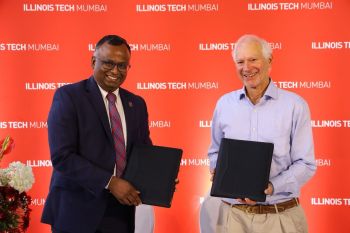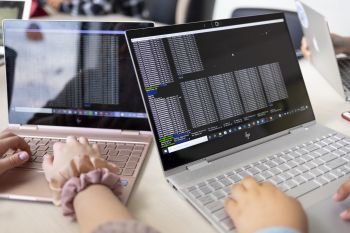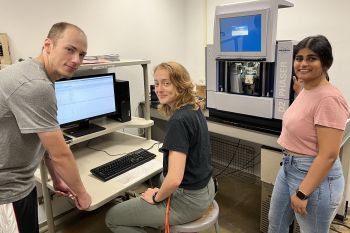Illinois Tech psychology researchers find communication is key in reducing prejudice in workforce
Team including universities from Britain surveyed police officers and found that autonomy-supportive communication helped garner buy-in for diversity, equity, and inclusion initiatives
CHICAGO—February 20, 2023—A team including two Illinois Institute of Technology associate professors of psychology and an Illinois Tech graduate has published a paper showing that autonomy-supportive communication is crucial in reducing prejudice in the workplace.
Associate Professors Nicole Legate and Arlen Moller, along with Maya Al-Khouja (PSYC ’16) teamed up with researchers from the University of Reading, Durham University, and the University of Surrey issued multi-wave surveys to more than 1,400 British police officers and staff to gauge the impact of autonomy-supportive communication practices within the context of real-world police training across a wide range of concepts, including diversity, equity, and inclusion in the UK. The study, which was published in the Journal of Applied Social Psychology, found that police officers who felt their autonomy was more supported by supervisors ultimately reported less antagonism toward diversity initiatives.
Moller, the study’s lead researcher, says the evidence-based motivation strategies investigated in the study are designed to increase the likelihood of buy-in, not just with individual programs but more extensively throughout society. The goal is for people to create good training programs to forge meaningful, lasting change by encouraging buy-in for ongoing investment of resources and energy.
“This theory that Nikki, Maya, and I are working with as a framework for organizing our research is called self-determination theory,” says Moller. “One of the foundations of the theory is that human beings have evolved to have a psychological need for autonomy.”
“You’ve got lots of employers, including police departments around the country—around the world—that have programs in place to try to reduce prejudice, reduce bias,” Moller continues. “But there’s mixed evidence on their effectiveness, and there is even some evidence that sometimes it makes things worse. Even with good intentions, sometimes the way programs are implemented make people resentful, feeling that they’re being accused of something wrongly, or talked down to, or coerced into participating. Ironically, that can lead people to behave in the opposite direction of what was hoped for.”
The team hopes that this study can lead more people to use autonomy-supportive techniques that are less likely to draw counterproductive backlash and more likely to garner cooperation, both in policing and more broadly in sectors such as healthcare and higher education. The researchers hope that more police officers will embrace the mindset of being a part of significant cultural changes in the way police work is done in their communities. While the issue won’t be solved easily or quickly, the team believes that motivating cooperation from people who are in professions where the cost of prejudice is especially high is a faster path to progress than fighting with them.
The team hopes that this study can lead more people to use autonomy-supportive techniques that are less likely to draw counterproductive backlash and more likely to garner cooperation, both in policing and more broadly in sectors such as healthcare and higher education. The researchers hope that more police officers will embrace the mindset of being a part of significant cultural changes in the way police work is done in their communities. While the issue won't be solved easily or quickly, the team believes that motivating cooperation from people who are in professions where the cost of prejudice is especially high is a faster path to progress than fighting with them.
Illinois Institute of Technology
Based in the global metropolis of Chicago, Illinois Tech was born to liberate the collective power of difference to advance technology and progress for all. It is the only tech-focused university in the city, and it stands at the crossroads of exploration and invention, advancing the future of Chicago and the world. It offers undergraduate and graduate degrees in engineering, computing, architecture, business, design, science and human sciences, and law. Illinois Tech students are guaranteed hands-on experiences, personalized mentorship, and job readiness through the university's one-of-a-kind Elevate program. Its graduates lead the state and much of the nation in economic prosperity. Its faculty and alumni built the Chicago skyline. And every day in the living lab of the city, Illinois Tech fuels breakthroughs that change lives. Visit iit.edu.
Media contacts
Kevin Dollear
Communications Manager
Illinois Institute of Technology
Cell: 773-860-5712
kdollear@illinoistech.edu




